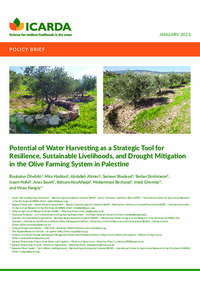Potential Of Water Harvesting as a Strategic Tool for Resilience, Sustainable Livelihoods, and Drought Mitigation in the Olive Farming System in Palestine

Authors:
This policy brief informs on the importance of adapting the MIRWH technique in the olive farming system in Palestine. It combines existing knowledge of the agriculture olive farming system in Palestine with the proven technology of the MIRWH. The policy brief builds on the analysis of the economic and financial viability of the MIRWH as an innovation system by deploying the enterprise budget tool to estimate the return, costs, and net returns associated with olive production under the MIRWH in the high and low slopes areas of Palestine. The policy considers the benefits of using MIRWH in the olive farming system that will support the farmers’ livelihood, especially vulnerable farmers and communities, through increasing olive and olive oil production, overall farm sustainability, decreasing agriculture input costs, overcoming challenges and difficulties to sustain olive productions (e.g., the need for irrigation in the summer season), and increase farmer resilient to climate shocks. On the other hand, the policy considers the combined technique benefits to enhance the overall ecosystem services through soil stabilization, increase soil moisture content, reduce runoff and erosion rates, and provide opportunities for enhancing farm soil biodiversity.
